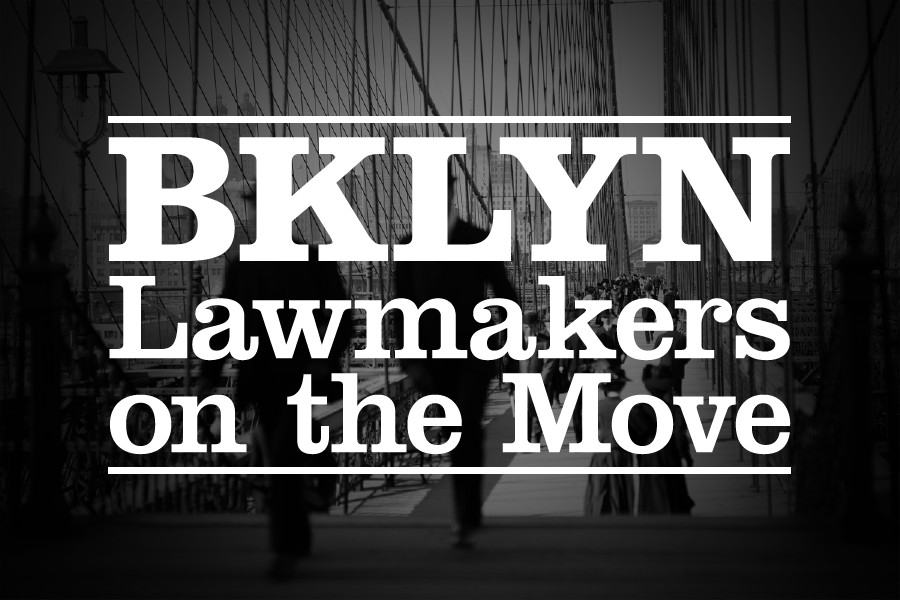Levin Expresses Condolences For Construction Death

Northern Brooklyn City Councilman Stephen Levin expressed his deep condolences for the death of a 19-year construction worker that died after a retaining wall collapsed at a 656 Myrtle Avenue construction site in Bedford-Stuyvesant.
Two others were also injured in the incident.
The Department of Buildings received a complaint on May 10 about potentially unsafe working conditions at the site, between Franklin Avenue and Skillman Street, according to public records.
“I was heartbroken to hear of the tragedy that took place on Myrtle Avenue today. My thoughts and prayers go out to the families of the workers during this difficult time. I have been assured that the Department of Buildings will be conducting a full and thorough investigation in the days ahead,” Levin said.
Williams Bill Protecting Tenants Signed into Law
Mayor Bill de Blasio, yesterday, signed into law three new measures to protect tenants from harassment, outlawing aggressive ‘buy-out’ practices used to force tenants out of rent-regulated apartments.
In fast-gentrifying neighborhoods, owners have used unscrupulous tactics to pressure tenants out of affordable apartments so they can reap rent increases from the turnover: making threats, harassing tenants at their workplace or at late hours of the night, hiring ‘Tenant Relocators’ to intimidate tenants into taking a buyout offer they’ve already refused.

Among these bills was one that Flatlands City Council Member Jumaane Williams introduced, which makes it unlawful for an owner to make a buyout offer without informing tenants of their right to stay in their apartment, to seek an attorney’s advice, and to decline any future contact on a buyout offer for 180 days.
“Our city cannot stand by while tenants are being harassed out of their homes. There are too many unscrupulous owners of rent stabilized buildings who will do anything to have a tenant vacate their apartment, including hiring a tenant relocator to get the job done. Tenants don’t deserve to be intimidated out of their homes, and should be informed of their rights to refuse buyout offers,” said Williams.
City Council Speaker Melissa Mark-Viverito and Council Member Dan Garodnick introduced the other measures that restrict landlords and/or their representatives into using unscrupulous methods to get long time tenants to move.
“We won’t let tenants be intimidated and forced out of their homes. These new laws protect tenants from harassment and aggressive buyout schemes, and simultaneously help the City keep neighborhoods affordable. We have a strong partnership with the City Council standing up for tenants, and we thank the sponsors of these laws for helping combat these unscrupulous practices,” said de Blasio.
Adams, Espinal, Cumbo Emphasize Ovarian Cancer Awareness
Brooklyn Borough President Eric L. Adams, Bushwick City Council Member Rafael L. Espinal, Jr., and Fort Greene City Council Member Laurie Cumbo, yesterday, Brooklyn’s observance of Ovarian Cancer Awareness Month in the rotunda of Brooklyn Borough Hall.
The launch, which took place during a cancer awareness expo that Adams hosted to offer resources, support, and information to Brooklynites, included the announcement that Brooklyn Borough Hall will be lit the color teal starting today through Saturday, September 12.
This is the third year Brooklyn Borough Hall will be illuminated to spread awareness of the disease, the 5th leading cause of cancer-related death amongst women and the deadliest of all gynecologic cancers.

“My mother would have been 63 years old this month,” said Espinal. “She lost her battle with ovarian cancer three years ago, and in her honor I am working to do my part to raise awareness about the signs and symptoms of this terrible disease. Ovarian cancer isn’t a ‘woman’s issue’; it affects fathers, sons, brothers, and husbands too.”
According to the American Cancer Society, about 21,290 women in the United States will receive a new diagnosis of ovarian cancer in 2015, with about 14,180 women dying from the disease.
A woman’s risk of getting ovarian cancer during her lifetime is about 1 in 75. Ovarian cancer mainly develops in older women; about half of those diagnosed are 63 years or older. Additionally, various studies have shown evidence that obesity and family history are relevant risk factors. The most common symptoms of ovarian cancer are bloating, pelvic or abdominal pain, trouble eating or feeling full quickly, and urinary symptoms like urgency or frequency.
“When we light Brooklyn Borough Hall teal, we shine a light on the impact ovarian cancer has on Brooklynites and our resolute commitment to spread much-needed awareness,” said Adams. “Early diagnosis is critical to combating and treating ovarian cancer, so any and all education we can share with our neighbors can make a real difference in real lives.”
Feds Give Subway $57 Million For Storm Recovery Projects
Governor Andrew M. Cuomo, yesterday, announced that the MTA received $57.1 million in two Federal Transit Administration grants for two major storm resiliency projects in subway stations: a new emergency communications system and a hardening project to protect station rooms that are critical to service delivery.

“Superstorm Sandy brought unprecedented disruption to the New York subway system – but now we are building the system back better and stronger than before,” said Cuomo. “This funding helps us move forward with critical upgrades that will keep the system running and keep travelers safe during an emergency. This is about strengthening our infrastructure with the next storm in mind, and I am thankful for the support of our federal partners in this effort.”
When Superstorm Sandy swept through the New York metropolitan area in October 2012, it left behind extensive damage to NYC Transit facilities throughout the subway system. A record storm surge inundated tunnels, filling critical operations rooms that housed electric equipment for signals, relays and communications with highly corrosive saltwater.
In addition to causing mass flooding in stations and tunnels, the storm also exposed a need for a better and faster way for supervisors to communicate with crew members and customers in times of emergency. Even after three years and thousands of hours of labor spent to repair and restore service to pre-Sandy levels, the subway system has yet to fully recover, with many Sandy-related repairs still to be made.
As part of the ongoing process to fix and fortify the system against future catastrophic weather events like Sandy, NYC Transit plans to replace the current emergency booth communication system that provides emergency and security communications between train supervisors and personnel across the subway system.

“We all know the subway system is the lifeblood of New York City. When Sandy’s floodwaters inundated three major subway tunnels with thousands of gallons of water, it was a major blow. Sandy’s devastation demanded we rebuild New York in a stronger and more resilient way in order to protect ourselves against future storms,” said U.S. Sen. Charles Schumer. “This federal funding will protect the power grids that keep our subway system working while ensuring instant communication at Rail Control Centers during a major storms. This funding and these efforts will make commuting safer and service better for countless New Yorkers.”

Congressman Jerrold Nadler said: “These funds are critical for hardening the subway system, and improving resiliency and emergency communications. I was proud to support federal funding for Sandy Recovery, and I applaud Governor Cuomo and the MTA for securing these important projects that will protect this vital transportation system, which so many New Yorkers rely upon, in the event of a future emergency.”
Congresswoman Nydia M. Velázquez said: “If Hurricane Sandy taught us anything, it is that proper preparation can help save infrastructure and reduce damage from extreme weather. These resources will go a long way toward ensuring our mass transit system is more resilient and can be operational more quickly in the event of future storms.”






